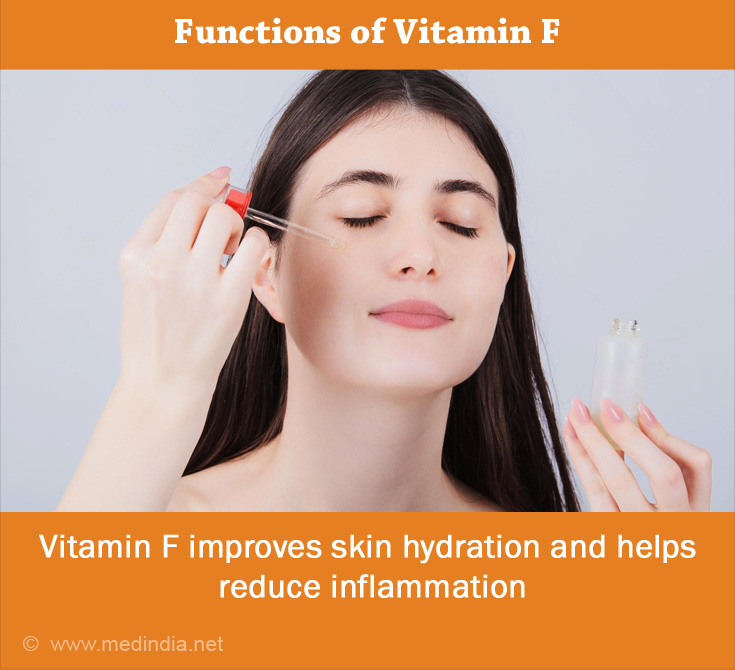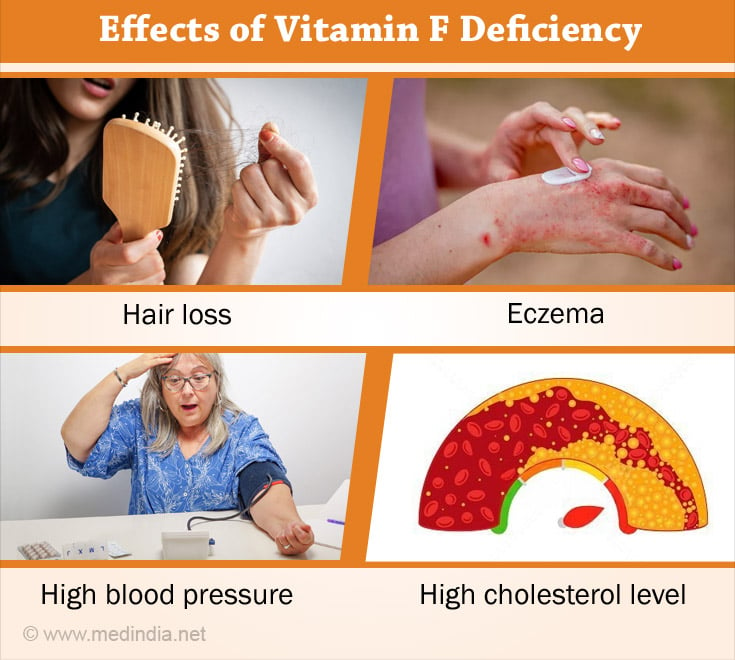- Essential Fatty acids - a review. - (https://pubmed.ncbi.nlm.nih.gov/17168664/)
- Lipids. - (https://www.ncbi.nlm.nih.gov/books/NBK234930/)
- Wound Healing and Omega-6 Fatty Acids: From Inflammation to Repair. - (https://www.ncbi.nlm.nih.gov/pmc/articles/PMC5925018/)
- Omega-3 Fatty Acids. - (https://www.ncbi.nlm.nih.gov/books/NBK564314/)
- Discovering the link between nutrition and skin aging. - (https://www.ncbi.nlm.nih.gov/pmc/articles/PMC3583891/)
- How do polyunsaturated fatty acids lower plasma cholesterol levels? - (https://pubmed.ncbi.nlm.nih.gov/6312241/)
- Dietary linoleic acid and risk of coronary heart disease: a systematic review and meta-analysis of prospective cohort studies. - (https://pubmed.ncbi.nlm.nih.gov/25161045/)
- Importance of maintaining a low omega-6/omega-3 ratio for reducing platelet aggregation, coagulation and thrombosis. - (https://www.ncbi.nlm.nih.gov/pmc/articles/PMC6546183/)
- Polyunsaturated Fatty Acids and Their Potential Therapeutic Role in Cardiovascular System Disorders-A Review. - (https://www.ncbi.nlm.nih.gov/pmc/articles/PMC6213446/)
- Essential fatty acids in growth and development. - (https://www.sciencedirect.com/science/article/abs/pii/016378279190006Q?via%3Dihub)
- The Effect of Omega-3 Fatty Acids on Rheumatoid Arthritis. - (https://pubmed.ncbi.nlm.nih.gov/32676556/)
- Fatty acid intake in relation to reproductive hormones and testicular volume among young healthy men. - (https://pubmed.ncbi.nlm.nih.gov/27834316/)
- Effect of a nutritional supplement on hair loss in women. - (https://pubmed.ncbi.nlm.nih.gov/25573272/)
- Healing fats of the skin: the structural and immunologic roles of the omega-6 and omega-3 fatty acids. - (https://pubmed.ncbi.nlm.nih.gov/20620762/)
- The usefulness of topical application of essential fatty acids (EFA) to prevent pressure ulcers. - (https://pubmed.ncbi.nlm.nih.gov/9233238/)
- Essential Fatty Acid Deficiency. - (https://www.sciencedirect.com/topics/pharmacology-toxicology-and-pharmaceutical-science/essential-fatty-acid-deficiency)
About
Essential fatty acids (EFA's) are sometimes referred to as Vitamin F. It refers to omega-3 and omega-6 fatty acids.
Vitamin F is composed of two fatty acids. The chemical names for vitamin F are linoleic acid (LA) and alpha-linolei cacid (LNA). Linoleic acid is considered to be the most complete fatty acid. There are two basic categories of EFA's - omega-3 and omega-6, which include linoleic acid and gamma-linoleic acid(1✔ ✔Trusted Source
Essential Fatty acids - a review.
Go to source).
The body is not capable of manufacturing essential fatty acids and so they have to be derived only from
The recommended dietary allowance of EFAs for adults is 1-2 % of the total daily caloric intake(2✔ ✔Trusted Source
Lipids.
Go to source).
The primary function of these fatty acids is to repair and create tissue in the body. They also help with metabolism, healing, reproductive health, skin and hair growth and can also help in treating chronic diseases(3✔ ✔Trusted Source
Wound Healing and Omega-6 Fatty Acids: From Inflammation to Repair.
Go to source).
Vitamin F is generally considered safe for daily consumption and toxicity has not been reported so far. It does not interact with most medicines. However, one should always consult a health care provider while adding a nutritional supplement to the diet(4✔ ✔Trusted Source
Omega-3 Fatty Acids.
Go to source).
What are the Sources of Vitamin F?
Here is a list of vitamin F rich foods(5✔ ✔Trusted Source
Discovering the link between nutrition and skin aging.
Go to source):
- Evening primrose oil
- Grape seed oil
- Almonds
- Peanuts
- Avocados
- Meat
- Fish like salmon, trout, mackerel and tuna
- Spirulina
- Sprouts
- Wheat germ
- Flaxseed Oil
- Oils of grains, nuts and seeds, such as soybean, walnuts, sesame, and sunflower
- Fish, fish oils, vegetable oils, fruits, and some wild green vegetables are rich sources of vitamin F.
Vitamin F supplements are available if you are not able to get enough vitamin F from food. They are marketed as vitamin F tablets, capsules, and pills.
What are the Functions of Vitamin F?
Here are some uses of Vitamin F -
- Lowers blood cholesterol level(6✔ ✔Trusted Source
How do polyunsaturated fatty acids lower plasma cholesterol levels?
Go to source) - Helps reduce the risk of heart disease(7✔ ✔Trusted Source
Dietary linoleic acid and risk of coronary heart disease: a systematic review and meta-analysis of prospective cohort studies.
Go to source) - Stimulates the growth of the beneficial intestinal bacteria.
- Helps regulate blood coagulation(8✔ ✔Trusted Source
Importance of maintaining a low omega-6/omega-3 ratio for reducing platelet aggregation, coagulation and thrombosis.
Go to source). - May assist in the reduction of weight.
- Supports the nervous system, cardiovascular health and circulatory function(9✔ ✔Trusted Source
Polyunsaturated Fatty Acids and Their Potential Therapeutic Role in Cardiovascular System Disorders-A Review.
Go to source). - Essential for proper working of the immune system.
- Vitamin F is necessary for normal growth and development, which increases height(10✔ ✔Trusted Source
Essential fatty acids in growth and development.
Go to source). - Enhances joint function and makes movement easier. Arthritis patients benefit from these fatty acids(11✔ ✔Trusted Source
The Effect of Omega-3 Fatty Acids on Rheumatoid Arthritis.
Go to source). - Supports glandular activity, especially the thyroid and adrenal glands.
- Essential for the normal functioning of the reproductive system(12✔ ✔Trusted Source
Fatty acid intake in relation to reproductive hormones and testicular volume among young healthy men.
Go to source). - Important in the manufacture of sex and adrenal hormones.
Vitamin F in tandem with vitamin D makes calcium available to the tissues, assists in the assimilation of phosphorus, and stimulates the conversion of carotene into vitamin A.

Vitamin F for hair
Vitamin F makes hair shiny and healthy. Vitamin F hair oil can improve scalp and hair health. Vitamin F supplements and antioxidants act efficiently against hair loss by improving hair density(13✔ ✔Trusted Source
Effect of a nutritional supplement on hair loss in women.
Go to source).
Vitamin F for skincare
- It makes the skin supple and gives a youthful appearance to the skin.
- Nourishes skin cells and is needed for healthy mucous membranes and nerves(14✔ ✔Trusted Source
Healing fats of the skin: the structural and immunologic roles of the omega-6 and omega-3 fatty acids.
Go to source). - The topical application of vitamin F cream and serum improves hydration and elasticity and helps prevent skin breakdown in individuals with poor nutritional status(15✔ ✔Trusted Source
The usefulness of topical application of essential fatty acids (EFA) to prevent pressure ulcers.
Go to source).
What are the Effects of Vitamin F Deficiency?
Deficiency of fatty acids may cause -
Decrease in the efficacy of immune system thereby resulting in slow healing and increased susceptibility to infections.

- Dull Hair
- Hair loss
- Eczema
- Damage to the kidneys, heart and liver
- Behavioral disturbances
- Dry eyes. Tear glands may dry up and not work effectively
- Rise in the blood pressure and cholesterol levels
- Blood is more likely to form clots(16✔ ✔Trusted Source
Essential Fatty Acid Deficiency.
Go to source)










